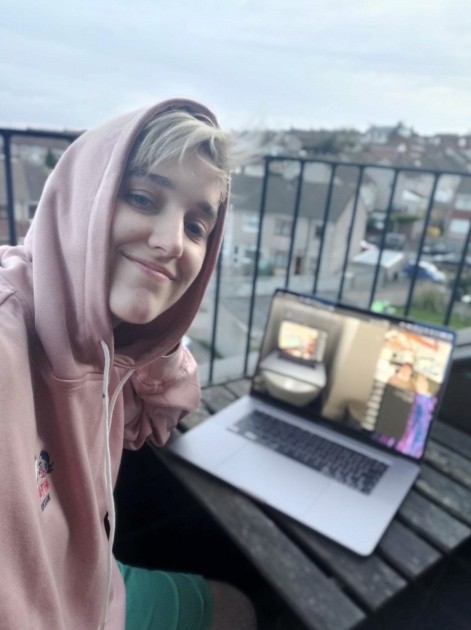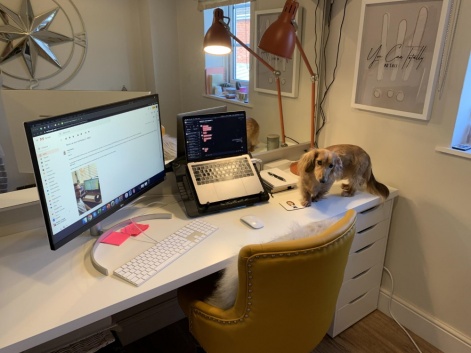Simon Platt is head of development at Kwalee.
Especially in unprecedented times like this, we are blessed to be in an industry where working from home, and in turn keeping safe, is a viable option for most if not all.
But while remote working is a relatively familiar concept in the games industry, with a considerable number having already done so full-time prior to the outbreak of COVID-19, that's not to say that it hasn't been a learning curve for the majority of us.
Perhaps the biggest one for us at Kwalee is the fact that we all really enjoy spending time in our office – something I'm especially grateful for thanks to my years spent in different trades!
The one thing a games company should not be is boring, and I think that's largely reflected in the kinds of workspaces we have come to expect in our industry. A lot of attention is paid to making these comfortable, inclusive and stimulating studio spaces, so it's always going to be a test of your culture when they're taken away.
With that in mind, how can we all leave the office behind while bringing that culture back to our various spare rooms and living rooms? Here are our biggest lessons so far.
Communication is key
The culture you establish at your company and the physical space you build together are intertwined.
In our case, there's a particularly clear example of this: we have a large presentation area in our office which exists primarily to host our weekly 'Creative Wednesdays', in which the entire company gathers for presentations of new game ideas from absolutely anyone in the company.

Replicating this dynamic digitally, even with the wealth of options available, is obviously a tough task without the shared physical space and truly face-to-face feedback. That's a fundamental element of Kwalee culture that's heavily tied to our physical space and is now being challenged, and I'm sure that you can think of similar examples at your company.
With enough communication, teams are capable of adapting brilliantly to all kinds of upheavalSimon Platt
Despite this, to say I have been impressed with the approach everyone has taken to their work in this period would be an understatement. Despite the upheaval, efficiency in all areas – including prototyping, a heavily collaborative process – seems to have gone up, if anything.
The reason for this is that teams are making the effort to be even more vocal, calling and checking in with each other more regularly. To ensure communication is upheld in your workplace, look at implementing morning and afternoon catch-up calls with team members and make sure you're visible on programs like Slack and help with status settings such as 'on-lunch' or 'in a meeting'. This all helps to keep people feeling closer and more like a team.
Ensure your team feels a sense of ownership in their work too - this crisis has already led to many people within Kwalee stepping up and proving they can be trusted to run teams and handle critical situations.
For us on a company level, that will be the biggest lesson from all this: that with enough communication, teams are capable of adapting brilliantly to all kinds of upheaval.
Keep the fun
On the social side of things, there have also been challenges. Very quickly, everybody on the team was missing the general bustle of the workplace. Sure, we had technologies in place to ensure we were all communicating consistently and video calls were happening throughout the day, but something was lost.
It didn't take long for members of the team to start creating new Slack and Discord channels, creating spaces where teams would be able to be 'live' all day, every day, and enjoy the same atmosphere they were used to in the office.

Where there were lunchtime games of pool, table tennis or Smash Bros., we now have online gaming sessions; where we used to gather on sofas and beanbags after work for our regular film nights, some now synchronise their viewing online.
None of this was dictated from above. It simply emerged from team members taking responsibility for their new working environments and maintaining a culture that they care about. It's important, especially in these times, to empower these champions within your teams and for them to know that they have full company backing.
Physical and mental wellbeing first
Your company culture means nothing if it doesn't prioritise the health of your team members, and it shouldn't be forgotten that this is why we're all working from home in the first place.
You can't assume that everyone remains comfortable working and communicating under these changed circumstancesSimon Platt
With our on-site gym no longer available to us, we have distributed some home workout advice to all Kwalee team members. We've also been proactive with distributing more general advice for working from home and even helping those who need it with the equipment they need to create more comfortable workspaces during this period.
On top of this, we know that for some of our staff – particularly new starters, whom this obviously hits hardest – there can be a cautiousness to reach out through the available channels for fear of 'nagging' or distracting others.
You may have spent a long time making your office a friendly and welcoming place for everyone, but you can't assume that everyone remains comfortable working and communicating under these changed circumstances. Check in on those who are not communicating as regularly and remind them that they are being looked out for.
We are trying to instill a sense that everyone's (digital) door is always open and as people become more comfortable with this it inspires a much more creative and efficient approach to development.
Looking ahead
In general, we’'e hugely proud of how everyone's pulling together and, anecdotally at least, it seems this is reflected across the industry.
Whether or not this is providing a glimpse into the future of work, as some are suggesting, is a bigger question. On that front, perhaps we could all learn a thing or two from our colleague Will, who has been working remotely for the past year and gets around this by steering a remote-controlled, camera-enabled robot around the office to socialise and attend meetings.
It goes without saying that this is a time of incredible upheaval and tragedy across the world, and the struggles of our industry in adapting utterly pale in comparison to the real human impact that COVID-19 is having across the globe.
How and when we will all be able to move beyond this period remains unclear, but it's safe to say that the lessons we are learning will stand us in good stead for the challenges to come. All we can do is our best to ensure that we learn as much as we can and make whatever small improvements we are capable of enacting, and of course, keep focusing on making games that bring entertainment and enjoyment to players during these difficult times!
About Simon Platt: A key figure in Kwalee’s rise to becoming the UK's biggest hyper-casual games company, Simon Platt manages all internal game development at Kwalee. He has managed and designed many of Kwalee's global hits, including Draw It, Shootout 3D and Jetpack Jump. Prior to working at Kwalee, he held roles at Codemasters and spent time as a professional wrestler, which has definitely helped him to amp up a busy team of developers!





















